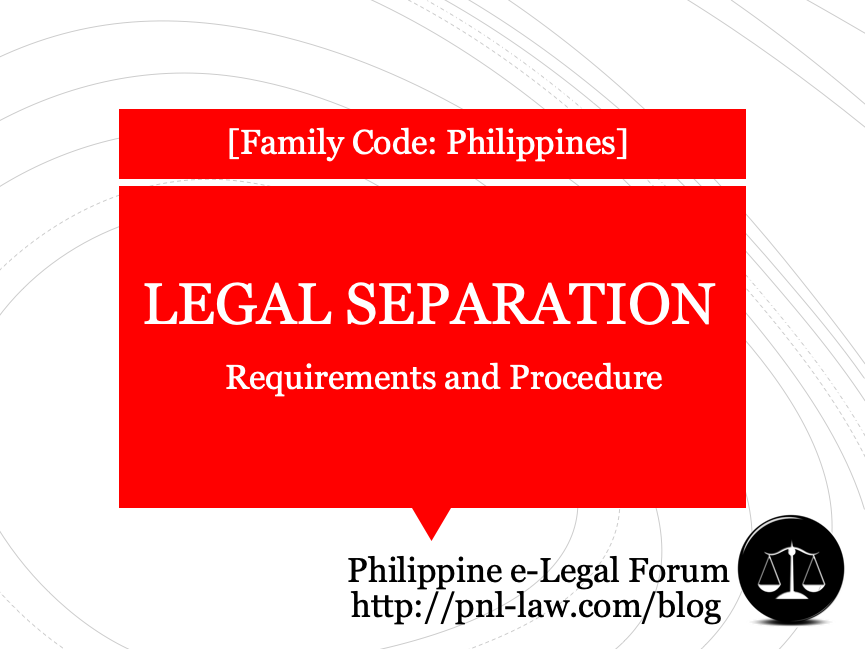


When filing a petition for legal separation, the petitioner-spouse must consider a number of factors. One, there must be a ground for legal separation (see Grounds for Legal Separation), which is different from the grounds for annulment or declaration of nullity (see Grounds for Annulment and Grounds for Declaration of Nullity). Two, legal separation does not result to the dissolution of marriage, which means that none of the spouses can remarry even if the petition is granted. Three, the procedure for legal separation is different from that of annulment or declaration of nullity (see Procedure for Annulment or Declaration of Nullity), but the duration and costs are comparably the same. The procedure for legal separation, based on A.M. No. 02-11-11-SC dated 4 March 2003, is discussed below.

In basic terms, the procedure involves: (a) the filing of the petition; (b) conduct of the collusion investigation, when necessary; (c) conduct of the pre-trial conference; (d) trial proper; (e) issuance of decision; and (f) registration of Decree of Legal Separation. The entire process is discussed in more detail below.
A petition for legal separation may be filed only by the husband or the wife, as the case may be within five years from the time of the occurrence of any of the grounds for legal separation. [see Grounds for Legal Separation]
Obviously, the petition may only be filed by the innocent spouse (in other words, not the spouse who gave rise to the ground for legal separation).
The petition for legal separation must:
Failure to comply with the preceding requirements may be a ground for immediate dismissal of the petition. However, no motion to dismiss the petition shall be allowed except on the ground of lack of jurisdiction over the subject matter or over the parties.
The petition shall be filed in the Family Court of the province or city where the petitioner or the respondent has been residing for at least six months prior to the date of filing, or in the case of a non-resident respondent, where he may be found in the Philippines, at the election of the petitioner. [Must-read: Residence: Guidelines to Validate Compliance with Jurisdictional Requirement (Annulment, Declaration of Nullity, Legal Separation)]
Summons must be served on the other spouse, called the respondent. Where the respondent cannot be located at his given address or his whereabouts are unknown and cannot be ascertained by diligent inquiry, service of summons may, by leave of court, be effected upon him by publication once a week for two consecutive weeks in a newspaper of general circulation in the Philippines and in such place as the court may order. In addition, a copy of the summons shall be served on respondent at his last known address by registered mail or by any other means the court may deem sufficient.
The summons to be published shall be contained in an order of the court with the following data; (1) title of the case; (2) docket number; (3) nature of the petition; (4) principal grounds of the petition and the reliefs prayed for, and (5) a directive for respondent to answer within thirty days from the last issue of publication.
The respondent shall file his answer within 15 days from receipt of summons, or within 30 days from the last issue of publication in case of service of summons by publication. The answer must be verified by respondent himself and not by counsel or attorney-in-fact.
If the respondent fails to file an answer, the court shall not declare him in default.
Where no answer is filed/or if the answer does not tender an issue the court shall order the public prosecutor to investigate whether collusion exists between the parties.
Any ground that might warrant a dismissal of the case (other than lack of jurisdiction over the subject matter or over the parties) may be raised as an affirmative defense in an answer.
In case a collusion investigation was ordered by the court (in cases where no answer is filed/or if the answer does not tender an issue), the public prosecutor must submit, within 1 month, report to the court on whether the parties are in collusion and serve copies on the parties and their respective counsels, if any.
If the public prosecutor finds that collusion exists, he shall state the basis thereof in his report. The parties shall file their respective comments on the finding of collusion within ten days from receipt of copy of the report. The court shall set the report for hearing and if convinced that parties are in collusion, it shall dismiss the petition.
If the public prosecutor reports that no collusion exists, the court shall set the case for pre-trial. It shall be the duty of the public prosecutor to appear for the State at the pre-trial.
The court may require a social worker to conduct a case study and to submit the corresponding report at least three days before the pre-trial. The court may also require a case study at any stage of the case whenever necessary,
The pre-trial conference, which is mandatory, is conducted after the cooling-off period (see: Cooling Off Period in Legal Separation).
On motion or motu proprio, the court shall set the pre-trial after the last pleading has been served and filed, or upon receipt of the report of the public prosecutor that no collusion exists between the parties. The notice of pre-trial shall contain:
The notice shall be served separately on the parties and their respective counsels as well as on the public prosecutor. It shall be their duty to appear personally at the pre-trial. The notice of pre-trial shall be sent to the respondent even if he fails to file an answer.
In case of summons by publication and the respondent failed to file his answer, notice of pre-trial shall be sent to respondent at his last known address.
If the petitioner fails to appear personally , the case shall be dismissed unless his counsel or a duly authorized representative appears in court and proves a valid excuse for the non-appearance of the petitioner. If the r espondent filed his answer but fails to appear , the court shall proceed with the pre-trial and require the public prosecutor to investigate the non-appearance of the respondent and submit within 15 days a report to the court stating whether his non-appearance is due to any collusion between the parties. If there is no collusion the court shall require the public prosecutor to intervene for the State during the trial on the.merits to prevent suppression or fabrication of evidence.
The foregoing effects are the same in case of failure to file the pre-trial brief or to comply with its required contents of the pre-trial brief.
At the pre-trial conference, the court may refer the issues to a mediator who shall assist the parties in reaching an agreement on matters not prohibited by law. The prohibited matters are:
Upon termination of the pre-trial, the court shall issue a pre-trial order, which shall control the trial of the case unless modified by the court to prevent manifest injustice. The pre-trial shall contain, among others, a directive to the public prosecutor to appear for the State and take steps to prevent collusion between the parties at any stage of the proceedings and fabrication or suppression of evidence during the trial on the merits.
The presiding judge shall personally conduct the trial of the case. No delegation of the reception of evidence to a commissioner shall be allowed except as to matters involving property relations of the spouses.
The grounds for legal separation must be proved (see Grounds for Legal Separation). No judgment on the pleadings, summary judgment, or confession of judgment shall be allowed.
The parties shall not be allowed to raise issues or present witnesses and evidence other than those stated in the pre-trial order.
The court may order the exclusion from the courtroom of all persons, including members of the press, who do not have a direct interest in the case. Such an order may be made if the court determines on the record othat requiring a party to testify in open court would not enhance the ascertainment of truth; would cause to the party psychological harm or inability to effectively communicate due to embarrassment, fear, or timidity; would violate the party’s right to privacy; or would be offensive to decency
No copy shall be taken nor any examination or perusal of the records of the case or parts thereof be made by any person other than a party or counsel of a party, except by order of the court.
The court may require the parties and the public prosecutor to file their respective memoranda in support of their claims within fifteen days from the date the trial is terminated. No other pleadings or papers may be submitted without leave of court. After the lapse of the period herein provided, the case will be considered submitted for decision, with or without the memoranda.
The court shall deny the petition on any of the following grounds:
If the court renders a decision granting the petition, it shall declare therein that the Decree of Legal Separation shall be issued by the court only after full compliance with liquidation under the Family Code. However, in the absence of any property of the parties, the court shall forthwith issue a Decree of Legal Separation which shall be registered in the Civil Registry where the marriage was recorded and in the Civil Registry where the Family Court granting the legal separation is located. The decision shall likewise declare that:
The parties, including the Solicitor General and the public prosecutor, shall be served with copies of the decision personally or by registered mail. If the respondent summoned by publication failed to appear in the action, the dispositive part of the decision shall also be published once in a newspaper of general circulation.
No appeal from the decision shall be allowed unless the appellant has filed a motion for reconsideration or new trial within fifteen days from notice of judgment.
An aggrieved party or the Solicitor General may appeal from the decision by filing a Notice of Appeal within fifteen days from notice of denial of the motion for reconsideration or new trial. The appellant shall serve a copy of the notice of appeal upon the adverse parties.
The court shall issue the Decree of Legal Separation after:
The court shall quote in the Decree the dispositive portion of the judgment entered and attach to the Decree the approved deed of partition.
Registration of decree. The prevailing party shall cause the registration of the Decree in the Civil Registry where the marriage was registered, in the Civil Registry of the place where the Family Court is situated, and in the National Census and Statistics Office. He shall report to the court compliance with this requirement within thirty days iron receipt of the copy of the Decree.
Publication of decree. In case service of summons was made by publication, the parties shall cause the publication of the Decree once in a newspaper of general circulation.
Best evidence. The registered Decree shall be the best evidence to prove the legal separation of the parties and shall serve as notice to third persons concerning the properties of petitioner and respondent.
There are specific rules for matters incidental to legal separation proceedings, as follows:

Pamaos & Labao Law Firm (P&L Law) is a full-service professional legal firm, located in Metro Manila, Philippines | Telephone: (+632) 7799-0589 | Email: info@pnl-law.com | Website: http://pnl-law.com
